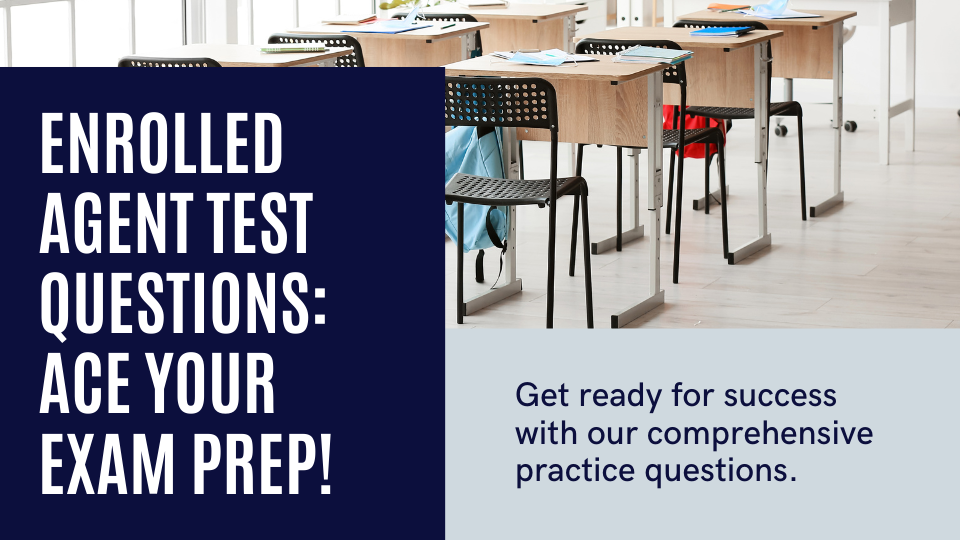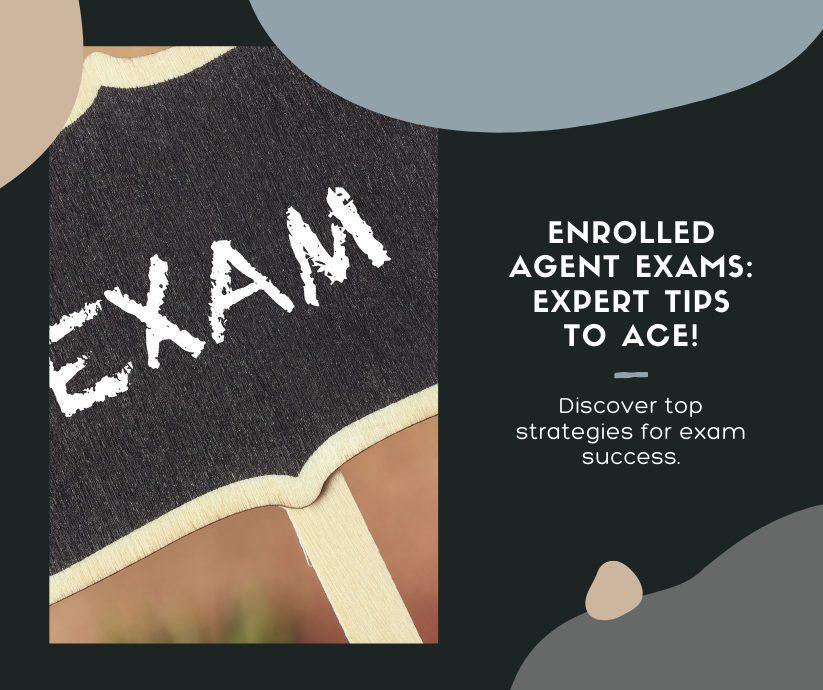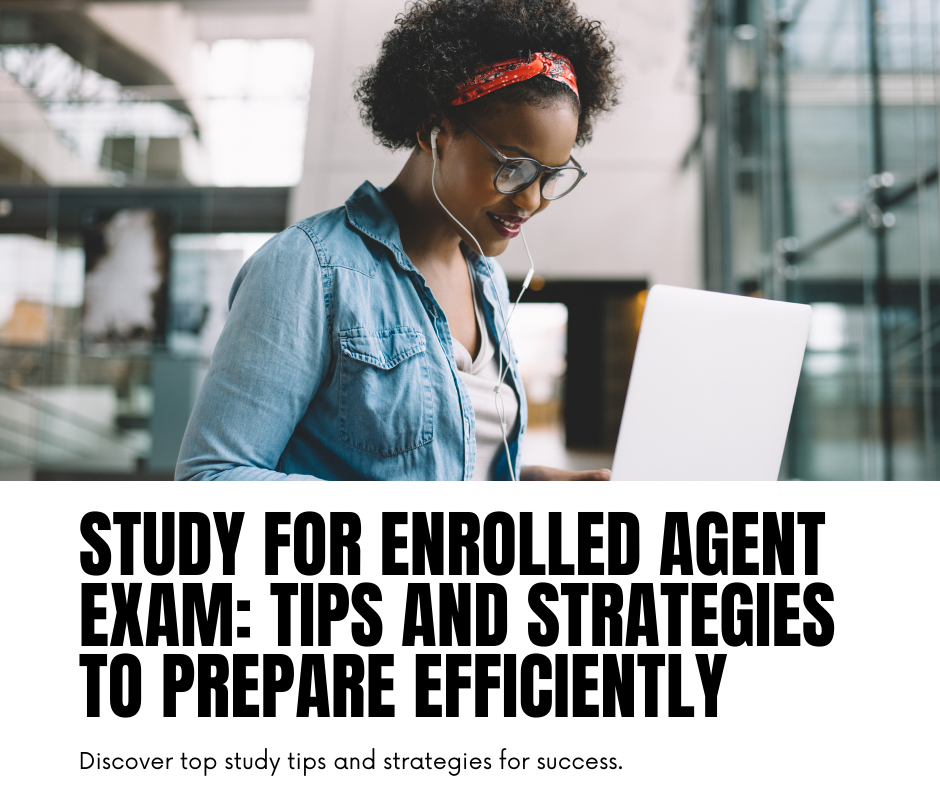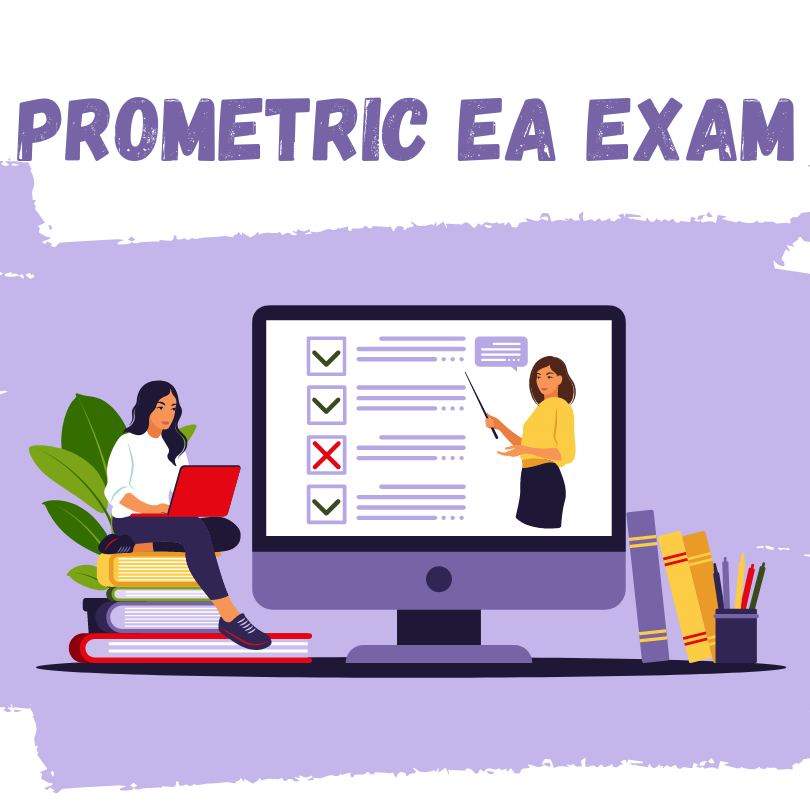Become an Enrolled Agent: Step-by-Step Guide
Passing the Enrolled Agent (EA) exam opens the door to...

The journey toward becoming an Enrolled Agent is marked by a rigorous examination process, the Special Enrollment Examination (SEE).
Preparation is paramount for success.
Immersing yourself in a sea of relevant and challenging test questions enhances your readiness exponentially.
An extensive test bank offers a myriad of scenarios, fostering adaptability in problem-solving approaches. This aligns perfectly with the unpredictable variables of the EA examination environment, sharpening your mental agility.
By repeatedly engaging with a diverse array of questions, patterns emerge, mental links solidify, and retention improves. The test bank’s comprehensive selection accelerates learning curves, ensuring a well-rounded preparation grounded in practical application.
Consistent utilization of this resource promotes a deep understanding of concepts over mere recognition, setting a strong foundation for professional expertise beyond the exam.
Exposure to a broad spectrum of question types is essential for comprehensive EA exam preparation. An extensive collection ensures constant engagement with fresh challenges, mimicking the unpredictability of the actual SEE.
By systematically working through a diversity of questions, candidates develop the acuity to handle varied tax scenarios. This experience builds confidence and sharpens problem-solving skills, essential for navigating the complexities of tax regulation on the exam.
“Depth of practice shapes mastery, enabling adaptation to multifaceted tax issues with ease.”
Through judicious practice of these questions, candidates can bridge the gap between theoretical knowledge and its practical application. Encountering a vast array of question types not only strengthens understanding but also trains you to efficiently allocate time across different sections of the SEE, bolstering your exam readiness.
Continuous improvement begins with the analysis of session scorecards, distilling performance metrics into actionable insights that guide targeted study efforts.
Scorecards break down performances by question type and subject matter, pinpointing strengths and gaps immediately.
Real-time feedback offered by scorecards informs on-the-spot adjustments for the next study session, optimizing learning paths effectively.
Each question’s time metric reveals pacing, an important component in developing exam time management strategies.
In-depth explanations linked to performance metrics facilitate understanding of mistakes, paving the way for rectified learning and better retention.
Subsequently, tracking progress through session scorecards fosters a strategic approach to mastering content, enabling a tailored study experience.
Effective study transcends basic comprehension; it necessitates a focus on areas offering the highest return on investment. Through detailed analytics, identify and target concepts and subjects requiring the most attention.
Precision in your preparation agenda is key, ensuring a study routine that concentrates on your unique areas of weakness. The EA Exam Test Bank, with its sophisticated filters and performance tracking, facilitates a bespoke study experience, elevating your grasp on challenging subjects.
Incorporate session scorecards into your strategy to continually refine focus. Their insights compel an adaptive study plan, ensuring that your efforts are concentrated on the matters that most influence exam success.
Strategic preparation for the EA exam necessitates leveraging Domain and Subject Filters to optimize study sessions.
Focusing studies with these filters sharpens your expertise in pertinent areas, making your preparation efficient.
The provided filters aim to structure learning around your individual performance, ensuring that no domain is left unmastered.
Mastery demands repetition, and the Repeat Filter personalizes this crucial study tactic.
Systems that enable filtering of repeated questions underscore efficient learning. Used judiciously, this feature dramatically raises the level of retention.
With the Repeat Filter, you confront questions until mastery is evident, offering the chance to rectify misunderstandings through repetition. Progress is achieved by identify patterns in recurrent mistakes, bolstering knowledge where it’s needed most.
Repetition solidifies learning, and the filter’s settings are uniquely attuned to focus your efforts on weak points. This refines your preparation, steeply elevating the likelihood of passing the EA exam.
This tool is a catalyst for relentless improvement, pushing you towards unquestionable proficiency.
The integration of our Genius AI Tutor alongside a vast question bank sets a new precedent for adaptive learning in EA exam preparation. As you engage with diverse question types, the AI meticulously analyzes your responses, pinpointing strengths and remodeling around areas that need extra attention. It deals adeptly with complexities, explaining nuances where needed and offering calculated projections of exam performance. This ensures your study time is not merely informative, but predictive and strategic, reinforcing your understanding and equipping you with insights that are intricately tailored to your learning curve.
The Genius AI Tutor elevates the conventional study experience into a dynamic and responsive dialogue. It not only guides but engages with you in elucidating concepts and calculations, ensuring comprehension.
Through personalized interaction, the AI becomes a mentor with its immediate feedback and in-depth explanations tailored just for you.
An AI Tutor session harnesses leading-edge technology to simulate a one-on-one tutoring experience. Here, complex tax laws and regulations are broken down into understandable fragments within a supportive, virtual environment.
Harness the power of adaptive learning as the AI tutor challenges your understanding, responds to your queries, and methodically leads you through intricate scenarios. Offering more than rote answers, it provides a rationale for each solution, crafting a robust foundation for your expertise. This continual, interactive support functions as a “digital coach,” accommodating your unique learning pace and style.
Dynamic adaptability is paramount to success.
The EA exam is a comprehensive assessment of a candidate’s tax law knowledge, demanding diligent preparation. Dynamic Study Plans transform this formidable task into manageable segments, adjusting in real-time as you progress. Tailored to individual learning curves, they ensure that no concept is left misunderstood.
Refinement of strategies is core to efficiency.
AI Score Projections, informed by cutting-edge algorithms, offer insight beyond traditional study metrics. They continuously analyze your performance, adapting study content to bolster weaker areas, thus streamlining your pathway to mastery. This technology bridges the gap between current competence and exam readiness.
Strategic review heightens readiness for the taxing exam.
With AI’s precise projections, the guesswork in preparation wanes. The system projects your potential exam scores based on real exam weightings, giving you a quantitative measure of where you stand. This feedback is instrumental for fine-tuning your approach and focusing your studies where it counts most.
Undoubtedly, Practice Exams emerge as critical instruments in the preparation process, closely mirroring the pressure and format of the actual EA exam. From the timed sessions to the authentic exam features like question flagging and an on-screen calculator, candidates are not only testing their knowledge but also their exam-taking strategies. This rigorous simulation fortifies their mental readiness, making the real exam environment feel familiar, thereby diminishing anxiety and improving performance on exam day.
Emulate the actual exam environment precisely.
With meticulous attention to detail, Authentic IRS SEE Practice Tests provide a realistic simulation of what candidates will encounter on the Special Enrollment Examination. Our practice tests replicate the format, timing, and question types with a high degree of fidelity, minimizing surprises on the day of the test. Specifically, each of our practice tests includes IRS-style questions rigorously crafted to represent the breadth and depth of the actual exam content.
Experience the authentic test-taking atmosphere.
These practice tests are designed to instill confidence by providing an authentic test-taking atmosphere. By incorporating critical features like the ability to strikeout answers, highlight text, and flag questions for review, candidates are equipped with the tools necessary to navigate the nuances of the exam interface effectively.
Test your knowledge under real exam conditions.
To truly master the IRS SEE, timing is as crucial as accuracy. Our practice tests are not merely a check on knowledge but a rehearsal of optimal time management. With each session timed to match the actual exam duration, you’re practicing to keep a steady pace, ensuring no question is left unanswered.
Sharpen skills with realistic question scenarios.
The practice tests offer a comprehensive array of realistic question scenarios, covering all IRS SEE topics to ensure a well-rounded review. This approach aligns with the EA exam sections—Individuals, Businesses, and Representation, Practices and Procedures—as per the 2023 IRS SEE guidelines. Our tests challenge you to apply knowledge rather than simply recall facts, fostering the analytical thinking critical for success.
Monitor progress with precision and acuity.
Assessing your real-time exam performance is pivotal. Our technology allows for acute tracking of every question you answer, giving you instant feedback on accuracy and pacing. When engaging with the practice exams, you immerse yourself in a simulated testing environment that mirrors the pressure and demands of the actual EA exam. Consequently, this exposes you to the rhythm and constraints of the timed test setting.
Precise exam pacing develops acumen.
Effective time management is cultivated through practice. Our platform’s structured pacing analysis helps pinpoint where you’re spending too much or too little time per question. By offering this transparency, you can adjust your strategy for the actual exam, potentially elevating your performance.
Optimize each moment for success.
Cultivating an awareness of time per question is essential. The timed sessions are designed not just to prepare you for the total examination length but to train you to allocate your time wisely on each section. This granular time management facilitates a comprehensive understanding of how to approach the exam strategically.
Preparation today yields confidence tomorrow.
Our system’s detailed time performance metrics provide valuable insights to prepare you for the rigors of the 2023 EA exam format. This data-driven approach not merely informs your current preparation but shapes the expertise and proficiency you will carry into the testing site. Mastery of time management and exam pacing becomes second nature, ensuring that on exam day, you perform with confidence.
The Enrolled Agent Exam is often considered to be challenging due to its comprehensive nature and the depth of knowledge required. It covers various topics related to federal taxation, including tax law, tax preparation, and tax ethics.
The exam is designed to test candidates’ understanding of complex tax concepts, their ability to analyze tax situations, and their knowledge of the Internal Revenue Code and regulations. It consists of three parts, each with multiple-choice questions that require careful analysis and application of tax rules.
In addition to the breadth of topics covered, the exam also requires candidates to demonstrate their ability to interpret and apply tax laws in real-life scenarios. This requires not only a solid understanding of tax principles, but also the ability to think critically and make informed decisions.
However, with diligent preparation and a deep understanding of the material, the Enrolled Agent Exam can be conquered. Many candidates find success by utilizing study materials, attending review courses, and dedicating sufficient time and effort to study.
While the exam may be challenging, it ultimately reflects the high standards and expertise expected of Enrolled Agents, who are authorized to represent taxpayers before the Internal Revenue Service (IRS). Earning the Enrolled Agent designation is a significant achievement and a testament to one’s knowledge and proficiency in the field of taxation.
The enrolled agent exam consists of multiple-choice questions that test your knowledge of tax law, tax preparation, and tax-related topics. The exam is divided into three parts, each focusing on different areas of tax practice.
In Part 1 of the enrolled agent exam, you will be asked to answer 100 multiple-choice questions. These questions cover topics such as individual taxation, income and deductions, and filing requirements. It is important to have a strong understanding of basic tax concepts and the ability to apply them to various scenarios.
Part 2 of the exam also consists of 100 multiple-choice questions. This section focuses on business taxation, including topics like partnerships, corporations, and estates and trusts. It is essential to have knowledge of the tax implications for different types of business entities and the rules governing their taxation.
Lastly, Part 3 of the enrolled agent exam contains 100 multiple-choice questions as well. This section covers topics such as tax practice, ethics, and professional conduct. It tests your understanding of the rules and regulations that govern enrolled agents and their role in tax representation.
In total, the enrolled agent exam consists of 300 multiple-choice questions spread across three parts. Each part has a time limit of three and a half hours, and you must pass each part with a score of 105 or higher to become an enrolled agent.
Passing the EA exam on the first try can be a challenging task, but with the right preparation and mindset, it is definitely achievable. The key is to approach the exam with a strategic plan and a solid understanding of the exam content.
First and foremost, it is crucial to familiarize yourself with the exam syllabus and understand the topics that will be covered. The EA exam is divided into three parts: Individuals, Businesses, and Representation, Practice, and Procedures. Each part focuses on different aspects of tax law and regulations. Take the time to study each topic thoroughly and ensure you have a good grasp of the concepts.
In addition to studying the content, practicing with sample questions and mock exams is essential. This will not only help you become familiar with the exam format and structure but also improve your time management skills. Develop a study schedule that allows for regular practice sessions and stick to it consistently.
Another important aspect of passing the EA exam on the first try is staying organized and focused. Create a study plan that breaks down the material into manageable chunks and set achievable goals for each study session. Avoid procrastination and distractions during your study time to make the most of your preparation.
Lastly, don’t underestimate the power of self-care during the exam preparation period. Take breaks when needed, get plenty of rest, and maintain a healthy lifestyle. Keeping yourself physically and mentally well will help you stay focused and perform at your best during the exam.
In conclusion, passing the EA exam on the first try requires a combination of thorough preparation, effective studying techniques, and a disciplined approach. By following a strategic plan and dedicating yourself to the study process, you can increase your chances of success in this challenging exam. Good luck!
Preparing for an enrolled agent test requires careful planning and focused studying. First, familiarize yourself with the content and format of the exam. Understand the topics that will be covered, such as taxation, ethics, and representation practices.
Next, create a study schedule that allows you to cover all the material effectively. Break down the topics into manageable chunks and allocate dedicated time for each. Utilize study resources such as textbooks, online courses, and practice exams to reinforce your understanding.
In addition to studying the theoretical aspects, it is crucial to practice applying the knowledge to real-life scenarios. Solve sample questions and case studies to enhance your problem-solving skills and gain confidence in your ability to analyze complex tax situations.
To further strengthen your preparation, consider joining study groups or enrolling in review courses. Interacting with fellow candidates and learning from experienced instructors can provide valuable insights and explanations.
Finally, utilize the weeks leading up to the exam for focused revision. Review your notes, summarize key concepts, and identify any areas where you feel less confident. Building a solid foundation of knowledge and regularly assessing your progress will greatly increase your chances of success on the enrolled agent test.

Passing the Enrolled Agent (EA) exam opens the door to...

The journey to becoming an Enrolled Agent is both challenging...

Imagine gazing at a promising future as a tax professional.However,...

Achieving the status of an Enrolled Agent is a significant...

Are you envisioning a successful career as an Enrolled Agent?It's...